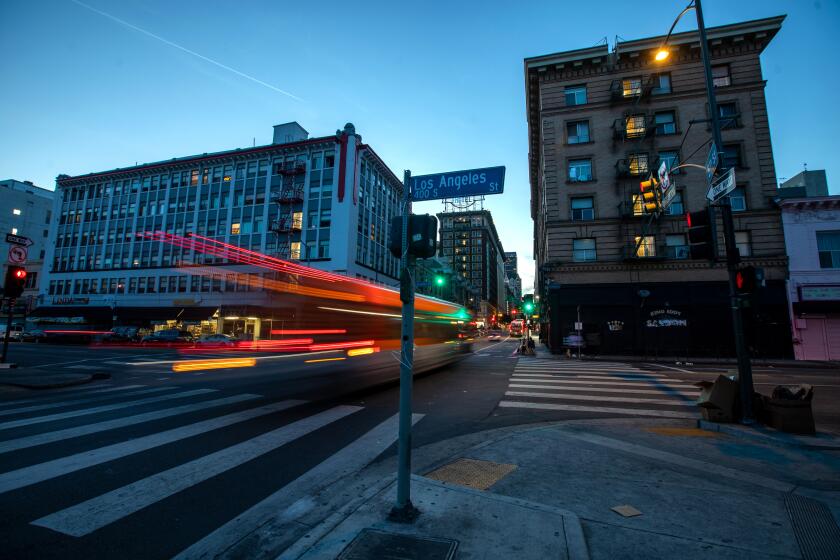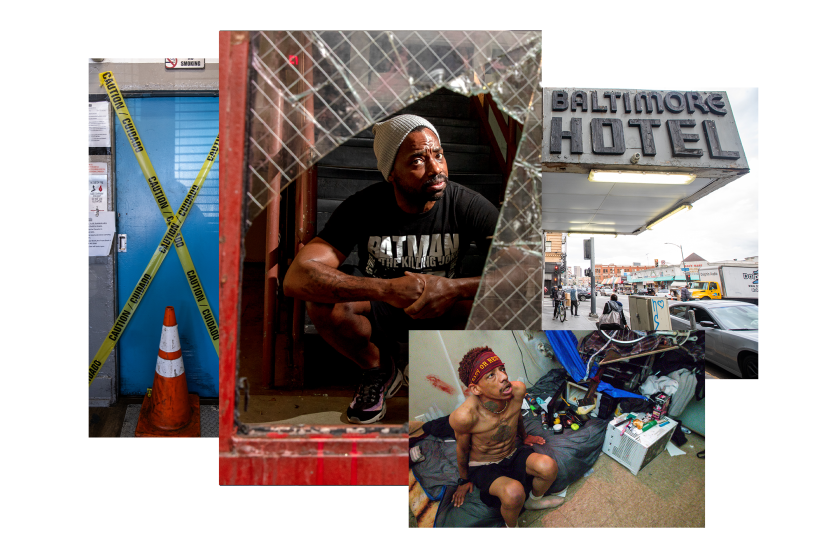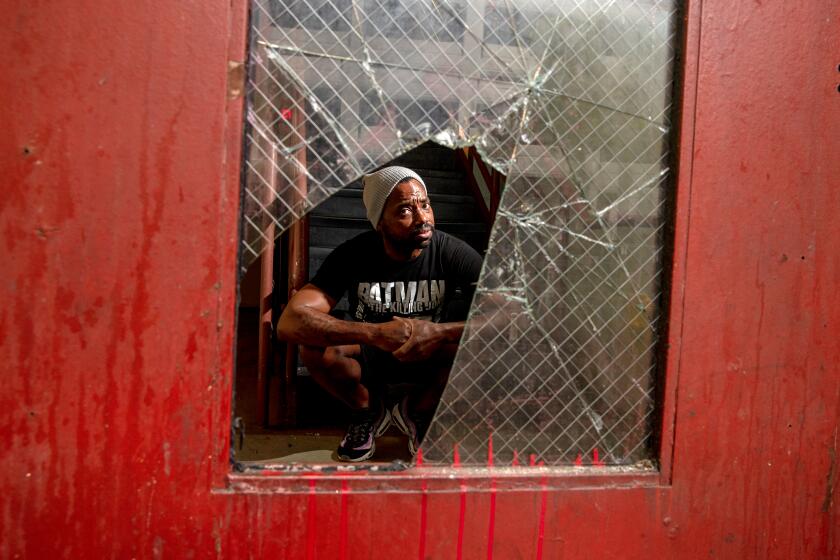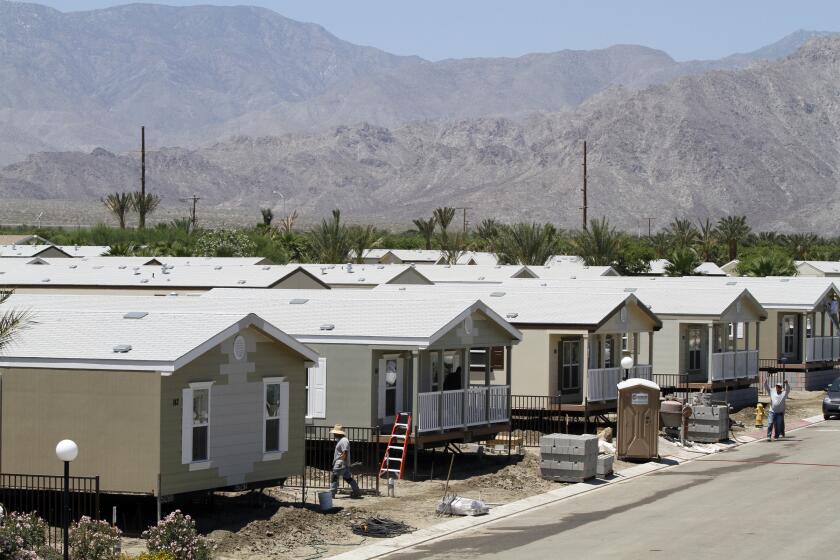How problems at two of Skid Rowâs largest landlords threaten to worsen L.A.âs homelessness crisis
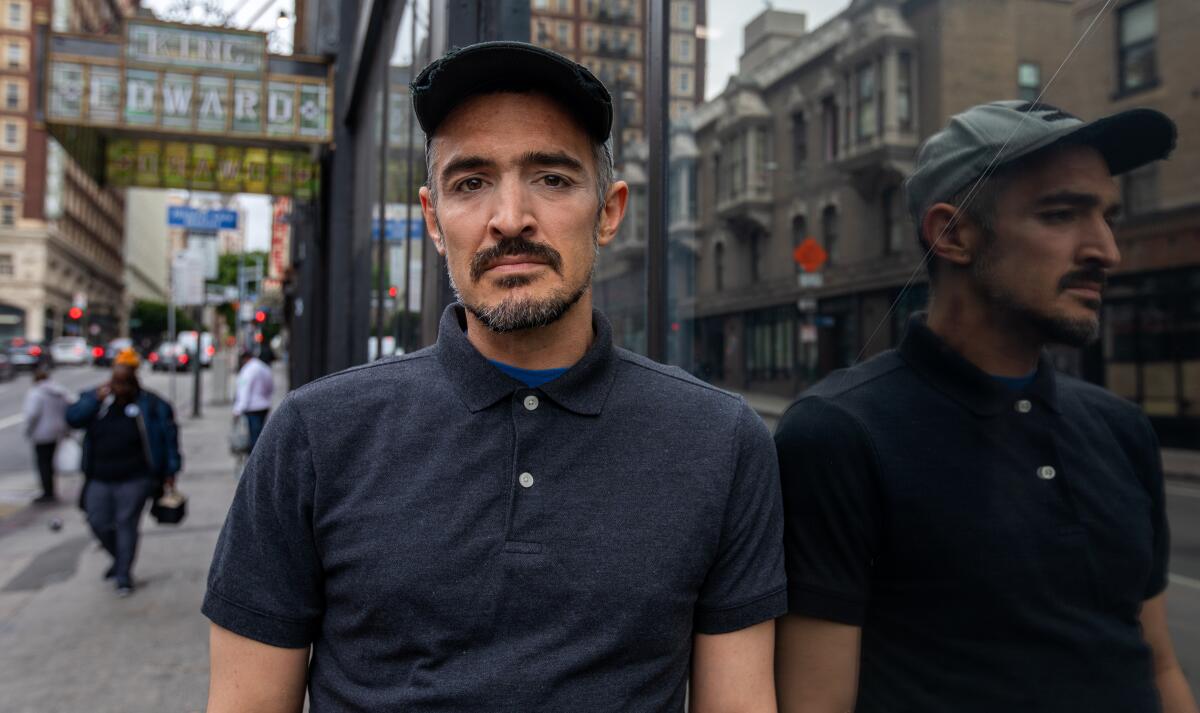
One of the most vexing factors contributing to Los Angelesâ homelessness problem is the lack of affordable places for people coming off the streets.
Part of the solution is supposed to be housing thatâs been in Skid Row for more than a century. Single-room occupancy hotels, or SROs, are made up of small rooms with shared bathrooms. With monthly rents often measured in hundreds of dollars rather than thousands, SROs are considered the first rung of housing above homelessness, tailored to help the 4,400 people now estimated to be living on the streets or in shelters in Skid Row.
But that rung is rickety. Two of L.A.âs largest landlords of SROs and other low-rent units in Skid Row, the Skid Row Housing Trust and the AIDS Healthcare Foundation, have struggled to make the 2,700 units they manage there safe and livable. The trust financially imploded earlier this year with conditions so dire that its 29 buildings were pushed into receivership. The AIDS groupâs tenants, meanwhile, have faced malfunctioning elevator, plumbing and electrical systems, vermin infestations and high crime rates, an earlier Times investigation found.
A Times investigation has found that many of the AIDS Healthcare Foundationâs more than 1,300 residents live in squalid conditions, with dozens under the threat of eviction.
AIDS Healthcare Foundation spokesperson Jacki Schechner did not respond to a list of questions from The Times but noted in an email that the foundation has spent nearly $30 million rehabilitating and repairing its buildings in L.A after purchasing them.
In prior statements, the foundation said its problems are the same as those affecting other Skid Row landlords: little public support, old buildings and a tenant population beset by mental health issues and drug addiction. Operations across its portfolio have run a more than $15-million deficit, it said.
The dismal state of Skid Rowâs SROs has left many of L.A.âs poorest residents without a reliable source of permanent housing and has frustrated politicians and advocates trying to respond to the homelessness crisis.
âThe problem is we donât have enough of anything,â said John Maceri, chief executive of the homeless services nonprofit People Concern. âThe sooner we can get any distressed properties, whether itâs in those two portfolios or any others, rehabbed and get them habitable, it opens up the pipeline.â
Blaine Heffron, 36, has lived in SROs owned by the two nonprofits. In early 2020, Heffron moved into the Skid Row Housing Trustâs Senator Hotel Apartments and quickly felt overwhelmed by the tiny room, grimy shared bathrooms and piles of trash littering the hallways. He lasted 15 months before giving up the apartment and a housing subsidy that had made his portion of the rent only $62 a month.
Heffron ventured less than half a mile away to the AIDS Healthcare Foundationâs King Edward Hotel. Even though his rent soared to $575 a month, it was still cheap enough to manage. Like at the Senator, Heffron had to share toilets and showers with other tenants. But his room was three times as large and the building was cleaner.
Then, as he described in a Times story published this fall, his 2-year-old pit bull died when the radiator in his room exploded.
âIn one, they killed my dog,â Heffron said. âIn the other, no one died but it was deplorable living conditions.â
Recently, The Times has been investigating Skid Rowâs troubled housing providers, digging into the failures of nonprofits such as AIDS Healthcare Foundation.
SROs emerged in the late 19th and early 20th centuries as spaces for transient workers who came to Los Angeles via railroads and evolved into permanent housing for some of the regionâs most vulnerable. Typically a few stories tall with dozens of private rooms and common bathrooms, SROs can be so spartan they lack kitchen facilities.
By the 1980s, they were falling apart. The Skid Row Housing Trust was created to rehabilitate and preserve as many SROs as it could, and the nonprofit was once considered a model for leveraging government subsidies to operate the buildings and provide supportive services to its tenants.
Despite the trustâs intervention, other SROs continued to deteriorate, leaving buildings with vacant and uninhabitable units. In 2017, the AIDS Healthcare Foundation began buying and rehabilitating buildings under a different strategy: avoiding public funding while not providing service programs in an effort to prove SROs could be run more cheaply.
Tenant advocates, homeless service agencies and other nonprofit landlords say poor decisions by leaders of the AIDS Healthcare Foundation and the Skid Row Housing Trust contributed to many of the problems theyâre facing.
In recent years, a revolving door of CEOs at the trust pursued a series of questionable moneymaking schemes, including a failed proposal to develop a 10-acre cannabis growing facility in South L.A. where its tenants would work. As the nonprofitâs balance sheet crumbled, executives continued to sign six-figure consulting contracts and hired relatives of top managers.
The Skid Row Housing Trust was a model for nonprofits housing homeless people in Los Angeles. Behind the scenes, it was imploding â leaving tenants in squalor.
The AIDS Healthcare Foundationâs entrance in the field came at the behest of Michael Weinstein, its leader since he co-founded the organization, now the worldâs largest AIDS charity, in the mid-â80s. Fueled by $2.2 billion in annual revenue largely from its pharmacy division, it has spent $190 million buying 16 properties in Los Angeles, managing 1,500 units.
But the group had no experience in homeless housing and has been unable to address some structural deficiencies in its buildings. And citing costs, it chose not to provide social services for its residents even though expert research shows doing so is essential in keeping tenants with mental health and addiction challenges housed.
Stephanie Klasky-Gamer, president and CEO of LA Family Housing, which manages 36 affordable and homeless housing developments across the region, said both organizations have not done the improvements and tenant care necessary to stabilize their buildings.
âI think in both cases, it was about the lack of attention to the needs of the assets and tenants living there,â Klasky-Gamer said.
Anita Nelson, the CEO of SRO Housing Corp., a nonprofit landlord created in the same period as the trust, said sheâs concerned her portfolio could face the same fate as the trustâs. Her organization owns 33 properties, half of which are SROs.
Nelson said that low voucher revenues, rising insurance premiums and slow rent collection, a backlog of building repairs and gaps in social services caused by the COVID-19 pandemic have left her group struggling.
âThe floodgates are hitting us,â Nelson said. âItâs kind of like an avalanche that has built up.â
Managing Skid Row Housing Trustâs buildings in receivership has been expensive, and itâs expected to take nearly a decade before all its assets are rehabilitated.
City leaders have lamented that each unit operates at a $300 deficit on average because federal housing vouchers donât provide enough to keep up with costs. The City Council has approved almost $40 million in taxpayer dollars to subsidize the operations and repairs since March, with more money planned for next year.
Mark Adams is overseeing the welfare of 1,500 tenants in Skid Row. In prior cases involving Adams, tenants faced the risk of eviction and property owners lost their houses.
Eight of the trustâs 29 properties have been turned over to other nonprofit landlords, with an additional nine expected to follow in the coming months. But a dozen of the trustâs SROs are in such bad shape that city officials believe their operations as currently structured will never break even.
This month, the City Council signed off on a plan to have the city attempt to take them over, petition the federal Department of Housing and Urban Development to increase tenantsâ rental subsidies and ultimately offer the buildings to homeless housing providers who would redevelop them. Initial estimates anticipate the process will last through 2031.
The AIDS Healthcare Foundation is continuing to snap up properties. This month, it announced an $11.9-million purchase of the Morrison Hotel, a 111-unit SRO on the outskirts of downtown.
Times staff writer Benjamin Oreskes contributed to this report.
More to Read
Sign up for Essential California
The most important California stories and recommendations in your inbox every morning.
You may occasionally receive promotional content from the Los Angeles Times.
